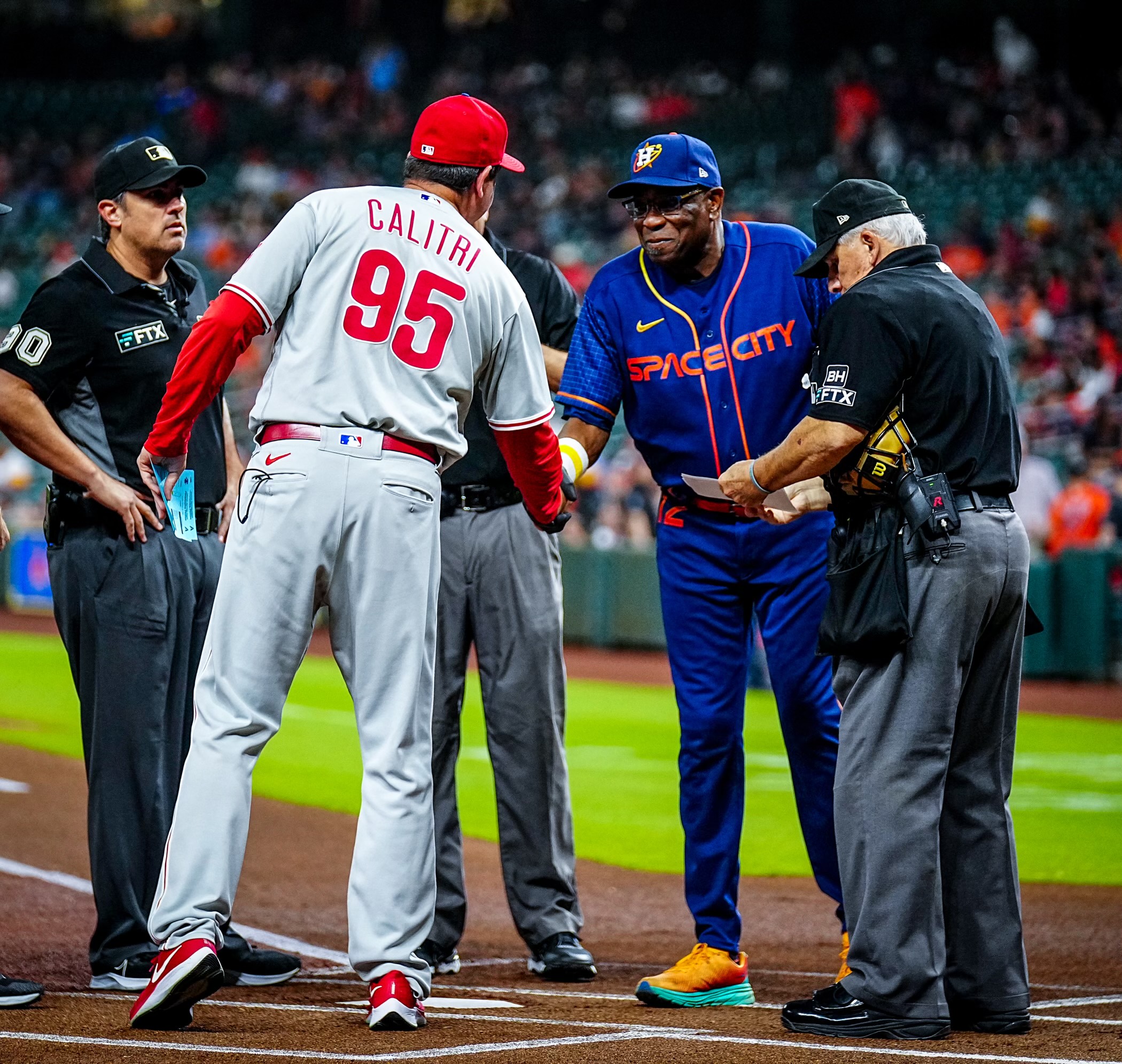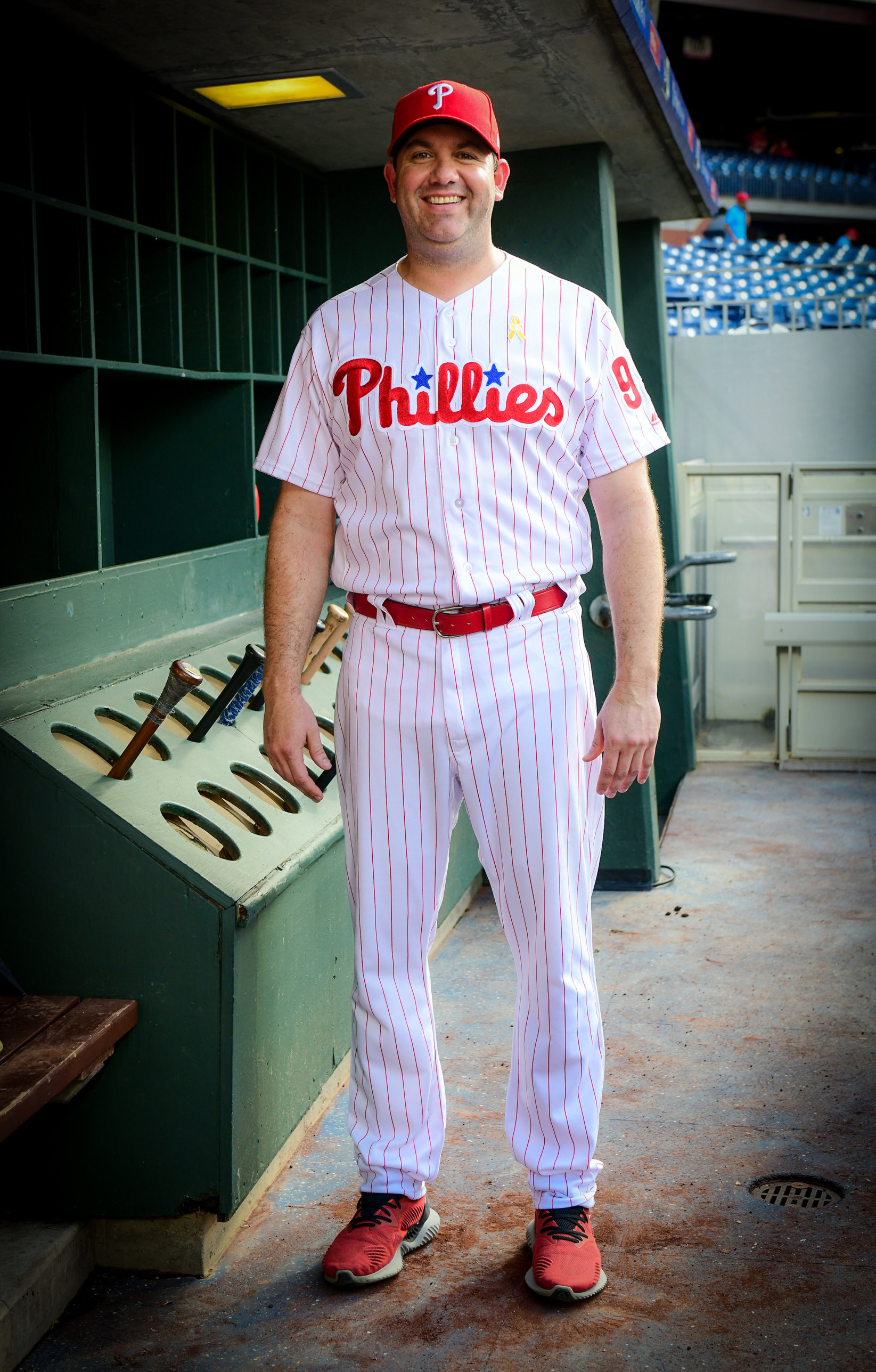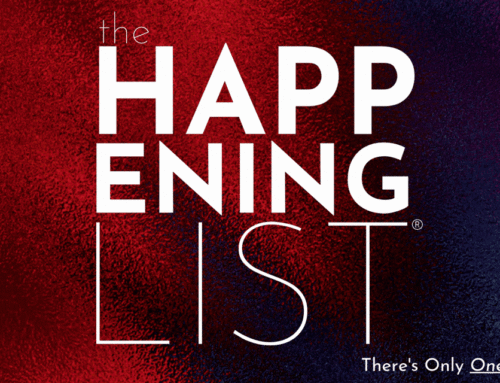Written by Bridget Reilly, Interview by Angela Giovine
Happenings sat down with Phillies Bench Coach Michael Calitri for a conversation about the road to the 2022 World Series from his perspective and to reflect on his own career journey in the sport.

Mike Calitri & Houston Astros Manager, Dusty Baker, exchange lineup cards. Photo Credit: Miles Kennedy
Red October. It’s a fever that takes hold of the Philadelphia area once in a while. It’s equal parts party, emotional roller coaster, and magic. From the players to management, to the fans, everyone plays a part in the recipe for Red October to emerge. It may seem like luck that Mike Calitri, or “Cal” as he is affectionately known throughout the industry, was given the promotion from Quality Assurance Coach to Bench Coach in the middle of the 2022 season. But Calitri, a man who has worn many hats and seen the game of baseball through many lenses, has spent decades in the sport; on the field, in the front office, and coaching in the dugout, sponging up countless pieces of data from various different vantage points in order to put himself in the position to offer value in this time and place. Just like the science of advance scouting, Calitri’s career is a series of calculated chances, putting himself in a position to broaden his experience and to learn from others of the past and present.
“Each little step along the way, I’ve met these people that have been able to teach me something new. And then when I got over to the Phillies, it was like… let’s give all this knowledge back and reboot a program here that can help the Phillies advance to the playoffs.”
– Mike Calitri,
Bench Coach Philadelphia Phillies

Phillies Bench Coach #95 Mike Calitri, Photo Credit: Miles Kennedy
The Boston native grew up around the game in a not-so-different passionate fan-base city to where he is now. He attended and played at Xaverian High School and went on to play in college at Clemson University. Upon graduating, he went into the minor leagues, where Calitri signed with the Cincinnati Reds for three seasons and then was traded to the Boston Red Sox minors for a year.
“If you can play for the team you grew up watching. It’s really amazing to be a little boy and then all of a sudden you’re an adult and playing,” he said.
In 2005, Vanderbilt University baseball head coach Tim Corbin, who was a former Clemson assistant coach and recruited Calitri, called with a job offer to be an Assistant Coach/Director of Baseball Operations for an up-and-coming team. It was the job offer that changed the trajectory of his career.
“I was fortunate that places I’ve been led me to my next occupation,” Calitri said.
Out of Left Field? The Analytical Approach.
Through this new position, the program grew and Calitri had the chance to meet many major league scouts, including several of the Tampa Bay Rays. This was his stepping stone to talk with Andrew Friedman, who was the General Manager of the Rays at the time (currently he is President of Baseball Operations for the Los Angeles Dodgers). What the Rays were doing was something entirely new to the game of baseball. Calitri said to him: “I don’t want to work for any of the other 29 teams. I look at what you’re doing here and I want to be a part of this and this process and learn from you.”
Calitri was hired in 2009 as an advance scouting coordinator at the time of Moneyball — the famous sportsbook by Michael Lewis about baseball analytics published in 2003 and made for the big screen in 2011. At the time, Tampa was at the forefront of the analytical approach to baseball, and all of Calitri’s chips were in. As a smaller market team, they utilized analytics to find young, evergreen stars to make the program successful. Bigger market teams will empty their pockets for big-time players, and if it doesn’t work out in their favor, they can fall on their stadium sales, sponsorship, and more to pay for it.
“[There] were Goliaths in that division…You can be consumed by the fact that they can spend so much more than you,” he said. “Here is this club in Tampa that decided that they were going to do things a little differently and they benefitted immensely from going a different way.”
Four years later, Calitri moved on to a traditional major league scouting job in Cleveland thanks to a former player of Corbin’s and Calitri’s at Vanderbilt, Carter Hawkins, who worked in the front office for the Indians (Carter is currently General Manager of the Chicago Cubs).
In Calitri’s time there, scouting professional players, the team went on a run for a couple of years. In 2016, they lost in the World Series (4-3) to the Chicago Cubs and lost in the ALDS (3-2) to the New York Yankees in 2017. This playoff push attracted others to Calitri, in pursuit of the same thing.
World Series Wonders
Above: Phillies Bench Coach Michael Calitri celebrates with his wife Ciara (née Egan), and children; Emiliana (9), Graziella (6) and Cristiano (3) Calitri
Until this year, the Philadelphia Phillies have not made the playoffs in 11 years. At the end of the 2017 season, they were on the hunt to find talent to make them a playoff-caliber team. Philly needed someone who had been a part of this newer-age thought process of strategy on the major league side.
“It’s been a nutty year. It’s actually been a nutty five years, really since I began with the Phillies,” said Calitri who was hired in the late fall of 2017 as the manager of Advance Scouting and Quality Assurance, one similar to his role at the Rays.
Prior to the 2018 season, the Phillies did not pour resources into this analytical world of the game. Upon the arrival of Calitri and others, many strategy plans were made going into each game, finding any marginal benefit to help win games.
“It’s really a balancing act. Honestly, you could know as much about a guy mathematically as you would want to know, but they’re still humans,” he said. “There are so many things that are unmeasurable and that’s the art of it all.”
It’s an insight that comes from the combination of years of studying the game with years of playing the game.

Phillies Vice President and General Manager Sam Fuld and Bench Coach #95 Mike Calitri, Photo Credit: Miles Kennedy
It’s in an effort to put players in a position to win. Part of that, this season, was managerial changes.
On June 3, 2022, the Phillies fired manager Joe Girardi and coaching assistant Bobby Meacham after the team’s rough start. In turn, former bench coach Rob Thomson was promoted to manager, and Calitri was promoted to Thomson’s former position as bench coach.
Thomson and Calitri have a relationship built on trust, and Thomson saw Calitri’s effort to learn from him and understand more about the game from another perspective. “It was a massive step for me,” Calitri said, but it was one that turned the corner for baseball in the city.
After the changeover, the Phillies won 20 games in a month from June 3 to July 3. This boosted morale extremely and continued to push them to squeeze into the playoffs come October.
It was a shock to the system.
“The city was thirsty for it. The ownership group was of course thirsty for it. The players and coaches were definitely ready to do this,” he said.
Calitri described the postseason as simply a celebration of how far they’ve come. At the pinnacle of their season, it was one massive party and the fan base support was unmatched, even compared to Boston, he said.
“Even when we went to Houston, it just wasn’t the same. The Philly fans — it’s like the 10th player.”
Following the loss of the World Series to the Astros (4-2), Calitri said the team and staff are decompressing for the next couple of weeks. However, there are less than 100 days until spring training and soon enough this team will return to the field in the hopes to make a similar run once again.
“You just hope that what they experienced and how they played in the last few weeks, is something that they’ll have as experience going into next season…” Calitri said. “I think that’s what makes teams go on a bit of a run. You get a core group of players that get this kind of amazing taste in their mouth and they want to replicate that every year.”
We Are Supported By:









